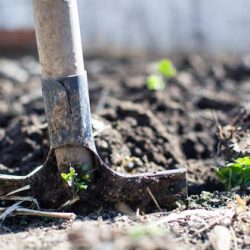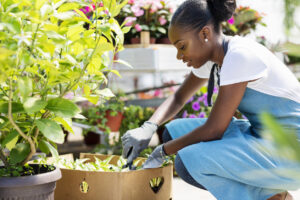In our fast-paced, digital world, the need for self-care has never been more pronounced. With the demands of work, family, and social life, many of us find ourselves overwhelmed, stressed, and in desperate need of a break. While self-care can take many forms, one activity that has been gaining popularity for its therapeutic benefits is gardening. Beyond being a hobby, gardening has been proven to be an effective means of self-care, offering physical, mental, and emotional well-being benefits. In this blog post, we will explore the myriad ways in which gardening promotes self-care, from nurturing mental health to encouraging physical fitness, and fostering a sense of connection with nature.
Mental Health Benefits of Gardening
Stress Reduction: Gardening provides an excellent opportunity to escape the stresses of daily life. Spending time in the garden allows individuals to disconnect from screens and immerse themselves in a calming, natural environment. The physical act of tending to plants and soil can help reduce cortisol levels, effectively lowering stress.
Mindfulness and Presence: Gardening demands a certain level of mindfulness. To cultivate a thriving garden, one must be present, paying attention to the needs of each plant. This focus on the present moment can serve as a form of meditation, helping individuals clear their minds and achieve mental clarity.
Boosted Mood: The sense of accomplishment that comes with nurturing plants and watching them grow can have a profound impact on one’s mood. The act of nurturing life and witnessing the beauty of nature in your own backyard can be a powerful mood booster.
Creativity and Problem-Solving: Planning a garden layout, selecting plants, and solving problems like pest infestations or plant diseases require creative thinking and problem-solving skills. Engaging in these activities can stimulate your mind and boost your confidence in handling challenges.
Physical Health Benefits of Gardening
Physical Activity: Gardening involves a range of physical activities, from digging and planting to weeding and watering. These activities can provide a low-impact workout that helps maintain or improve physical fitness, increase strength, and promote flexibility.
Sunlight Exposure: Spending time in the garden exposes individuals to natural sunlight, which is a primary source of vitamin D. Adequate vitamin D levels are essential for maintaining bone health and overall well-being.
Fresh Air: Gardening encourages spending time outdoors and breathing in fresh air. This can lead to improved lung function and overall respiratory health.
Healthy Eating: Many gardeners choose to grow their own fruits and vegetables, which can lead to a diet rich in fresh, organic produce. Consuming homegrown, nutrient-dense foods can contribute to better overall health.
Emotional Well-Being Benefits of Gardening
Sense of Accomplishment: Watching plants thrive and bloom can provide a profound sense of accomplishment. This sense of achievement can boost self-esteem and self-worth.
Connection with Nature: Gardening fosters a deep connection with the natural world. Being in tune with the rhythms of the seasons and observing the intricate web of life in the garden can promote a sense of awe and wonder.
Stress Reduction: Gardening provides a tranquil and serene environment that encourages relaxation. The act of gardening itself, such as the tactile experience of touching soil and plants, can have a soothing effect on the mind.
Social Interaction: Gardening can also be a social activity, offering opportunities to connect with like-minded individuals. Joining a community garden or participating in gardening clubs can provide a sense of belonging and support.
Gardening as a Form of Self-Care Ritual
Routine and Structure: A custom self care corporate gifts expert told me gardening can provide a sense of routine and structure in one’s life. Having a regular gardening schedule can help individuals establish healthy habits and reduce feelings of chaos.
Garden Sanctuary: Many people create a personal sanctuary within their garden—a place where they can escape, relax, and recharge. This designated space can serve as a refuge from the demands of daily life.
Reflection and Contemplation: The act of gardening often allows for moments of quiet reflection and contemplation. These moments can be instrumental in gaining clarity, setting goals, and finding purpose.
Tips for Incorporating Gardening into Your Self-Care Routine
Start Small: If you’re new to gardening, begin with a small garden bed or a few potted plants. Gradually expand your garden as you gain confidence and experience.
Set Realistic Goals: Establish achievable gardening goals that align with your time and energy constraints. Don’t overwhelm yourself with an elaborate garden if you’re just starting out.
Learn and Experiment: Gardening is a continuous learning process. Embrace the opportunity to experiment with different plants, techniques, and designs. Gardening challenges can be rewarding and educational.
Share Your Garden: Invite friends and family to enjoy your garden space with you. Sharing the experience can enhance the sense of connection and community.
Conclusion
In an era where self-care is of paramount importance, gardening stands out as a versatile and rewarding activity that promotes physical, mental, and emotional well-being. The act of nurturing plants, connecting with nature, and creating a garden sanctuary can have a profound impact on our overall quality of life. As you embark on your own gardening journey, remember that it’s not just about growing plants; it’s about cultivating wellness and self-care in every sense of the word. So, grab your gardening gloves, dig in the dirt, and let the therapeutic benefits of gardening transform your life, one seed at a time.


